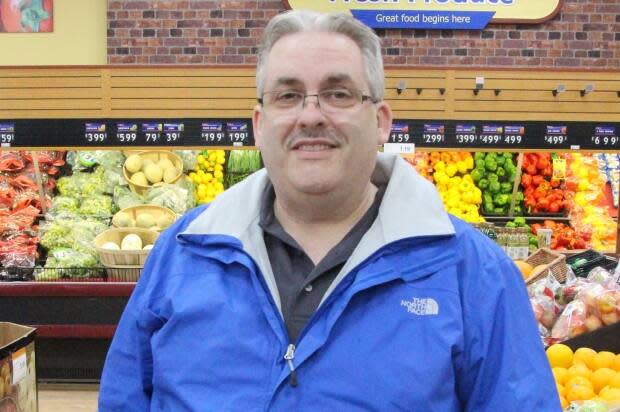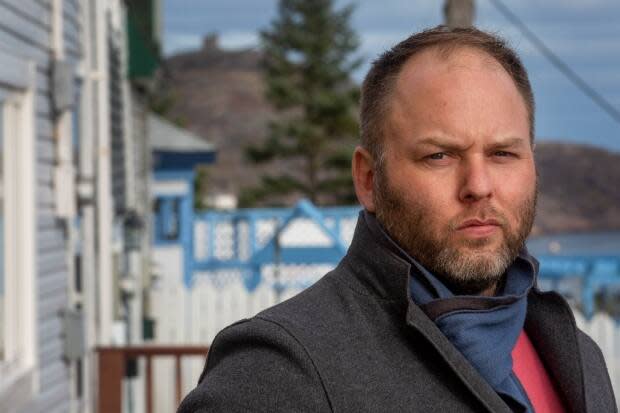Happy Valley-Goose Bay removing public benches to combat 'loitering and illegal activity'


The Town of Happy Valley-Goose Bay has removed several public benches around the community, including at the entrance to a bike trail and near the American military monument, a move town council believes will combat loitering and illegal activity.
"We're all witnessing the increase in the loitering," said Mayor George Andrews on Friday.
"Intoxicated folks, groups of folks. The evening before last, we had 20 to 25 folks loitering around the plane, throwing rocks, beer bottles, that kind of stuff."
Andrews said this type of behaviour has become common around benches, with larger groups of people loitering since the Labrador Winter Games in March.
"We don't profess that this will fix the problem," Andrews said, of removing the benches.
"What we're trying to do is just prevent those gatherings and that activity, you know, people sleeping, drinking, that kind of deal in these particular locations."
Andrews said council spent a lot of time deliberating on how to deal with this issue and concluded that removing the benches as a temporary measure would increase public safety.
"We have spent countless, countless, countless hours trying to discuss this problem," Andrews said.
"We are trying the absolute best that we can based on what we have in our toolbox to be able to enhance safety in town. So you know, is this the absolute best idea? No, probably not. But at the end of the day, it's one small thing that council can do and we decided to take that action."

The decision has been controversial in Happy Valley-Goose Bay, with some residents criticizing the council's decision on social media. Some have complained that removing the benches doesn't address larger issues around homelessness and addictions and takes away benches from people who use them regularly while walking, but Andrews said that hasn't been happening much lately.
"Someone who is walking down the road or whatever and wishes to take a break, is probably not going to stop where there's areas with eight or ten people gathered," he said.
Andrews said the town is working on other ways to address the issue, including hiring a municipal enforcement officer, though he doesn't figure that will be a permanent solution either.
"A single municipal enforcement officer is only going to work so many hours a day," he said.
The town has also been trying to discuss potential solutions with the province. Andrews said they've asked for more information on how some promises in the most recent provincial budget could fund security initiatives, though they haven't heard back yet aside from being told that a call will be scheduled.

Meanwhile, Doug Pawson, executive director of End Homelessness St. John's, said removing these benches is a decision that negatively impacts everyone in Happy Valley-Goose Bay.
"I can appreciate that the town is feeling like they're left with no other option but to remove benches," Pawson said. "On the other hand, I think the lens by which these types of decisions need to be made is human rights."
"The intention might be for health and safety reasons or to mitigate risk as the mayor was saying, but the effect that it has might prohibit individuals from availing of a public good that might be available to another person or community."
Removing a public bench doesn't solve homelessness … it just pushes the problem that they're trying to resolve somewhere less public. - Doug Pawson
As well, Pawson said it is likely that the people loitering around the benches are experiencing homelessness or might have mental health or substance use issues. While he opposes the removal of the benches, he thinks it might kick start a more positive outcome in the long term.
"What it can do is bring parties back to the table for meaningful conversation about how to address the situation in a way that doesn't violate rights and really refocuses the efforts on some of the root causes of why people are experiencing homelessness," he said.
Pawson said this is an issue that requires collaboration from all three levels of government.
"I appreciate that it's the provincial government that plays the role in supporting emergency shelter services and housing services, but there's no level of government absolved from that responsibility," he said.

Pawson suggests that the municipality hiring support workers would be a better solution.
"That's a more productive conversation as to how to support folks, not remove services from the general population."
Pawson said issues like this are springing up all over the province, as homelessness is increasing everywhere due to the housing crisis.
"Removing a public bench doesn't solve homelessness in Happy Valley-Goose Bay or anywhere," Pawson said. "It just pushes the problem that they're trying to resolve somewhere less public and less visible."
"It may result in really bad outcomes like people being hurt or worse. And it might not happen in a public space and so the city might think they're absolved, but they're not."


